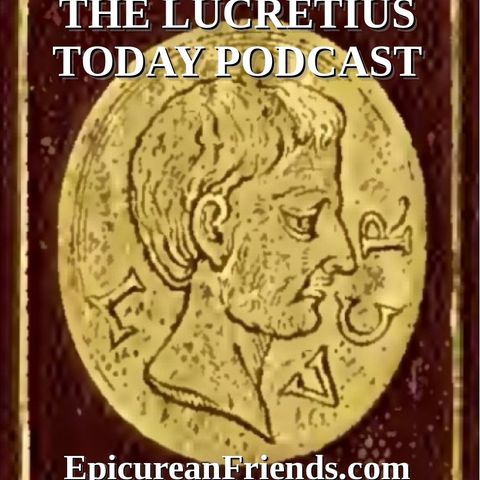Episode 231 - Cicero's OTNOTG - 06 - How would you live if you were certain that there are no supernatural gods and no life after death?

Download and listen anywhere
Download your favorite episodes and enjoy them, wherever you are! Sign up or log in now to access offline listening.
Episode 231 - Cicero's OTNOTG - 06 - How would you live if you were certain that there are no supernatural gods and no life after death?
This is an automatically generated transcript. Please note that complete accuracy is not guaranteed.
Description
Welcome to Episode 231 of Lucretius Today. This is a podcast dedicated to the poet Lucretius, who wrote "On The Nature of Things," the most complete presentation of Epicurean philosophy...
show moreToday we are continuing to review the Epicurean sections of Cicero's "On the Nature of The Gods," as presented by the Epicurean spokesman Velleius, beginning at the end of Section 10.For the main text we are using primarily the Yonge translation, available here. The text which we include in these posts is the Yonge version, the full version of which is here at Epicureanfriends. We will also refer to the public domain version of the Loeb series, which contains both Latin and English, as translated by H. Rackham.Additional versions can be found here:
- Frances Brooks 1896 translation at Online Library of Liberty
- Lacus Curtius Edition (Rackham)
- PDF Of Loeb Edition at Archive.org by Rackham
- Gutenberg.org version by CD Yonge
Today's TextXII. Empedocles, who erred in many things, is most grossly mistaken in his notion of the Gods. He lays down four natures as divine, from which he thinks that all things were made. Yet it is evident that they have a beginning, that they decay, and that they are void of all sense.Protagoras did not seem to have any idea of the real nature of the Gods; for he acknowledged that he was altogether ignorant whether there are or are not any, or what they are.What shall I say of Democritus, who classes our images of objects, and their orbs, in the number of the Gods; as he does that principle through which those images appear and have their influence? He deifies likewise our knowledge and understanding. Is he not involved in a very great error? And because nothing continues always in the same state, he denies that anything is everlasting, does he not thereby entirely destroy the Deity, and make it impossible to form any opinion of him?
Information
| Author | Cassius Amicus |
| Organization | Cassius Amicus |
| Website | - |
| Tags |
-
|
Copyright 2024 - Spreaker Inc. an iHeartMedia Company
